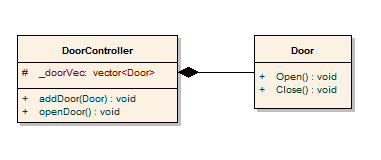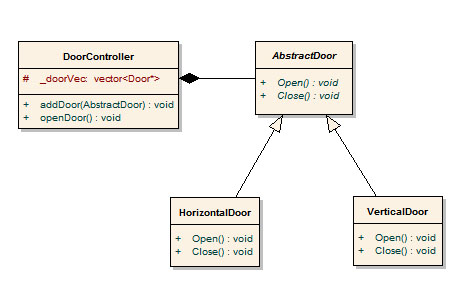for_each
来源:互联网 发布:淘宝假货申诉凭证图片 编辑:程序博客网 时间:2024/05/17 22:27
Procedure Based與for_each()搭配 ///使用函数
 /*
/* 2
 (C) OOMusou 2007 http://oomusou.cnblogs.com
(C) OOMusou 2007 http://oomusou.cnblogs.com3
 Filename : GenericAlgo_for_each_GlobalFunction.cpp
Filename : GenericAlgo_for_each_GlobalFunction.cpp4
 Compiler : Visual C++ 8.0 / BCB 6.0 / gcc 3.4.2 / ISO C++
Compiler : Visual C++ 8.0 / BCB 6.0 / gcc 3.4.2 / ISO C++5
 Description : Demo how to use for_each with global function
Description : Demo how to use for_each with global function6
 Release : 05/11/2007 1.0
Release : 05/11/2007 1.07
 */
*/8
 #include <iostream>
#include <iostream>9
 #include <vector>
#include <vector>10
 #include <iostream>
#include <iostream>11
 #include <algorithm>
#include <algorithm>12

13
 using namespace std;
using namespace std;14

15
 void printElem(int& elem) {
void printElem(int& elem) {16
 cout << elem << endl;
cout << elem << endl;17
 }
}18

19
 int main() {
int main() {20
 int ia[] = {1, 2, 3};
int ia[] = {1, 2, 3};21
 vector<int> ivec(ia, ia + sizeof(ia) / sizeof(int));
vector<int> ivec(ia, ia + sizeof(ia) / sizeof(int));22

23
 for_each(ivec.begin(), ivec.end(), printElem);
for_each(ivec.begin(), ivec.end(), printElem);24
 }
}
執行結果
 1
1 2
2 3
3
23行
 for_each(ivec.begin(), ivec.end(), printElem);
for_each(ivec.begin(), ivec.end(), printElem);
只需將vector::begin(),vector::end()和global function name傳給for_each()即可,再也不用for迴圈那種複雜的語法了。
2.傳入參數
若要傳參數給global function,就不能再只傳global function name而已,必須透過ptr_fun()這個function adapter將global function轉成function object,然後再用bind2nd()將參數bind成一個function object。
 /*
/* 2
 (C) OOMusou 2007 http://oomusou.cnblogs.com
(C) OOMusou 2007 http://oomusou.cnblogs.com3
 Filename : GenericAlgo_for_each_GlobalFunctionWithParameter.cpp
Filename : GenericAlgo_for_each_GlobalFunctionWithParameter.cpp4
 Compiler : Visual C++ 8.0 / BCB 6.0 / gcc 3.4.2 / ISO C++
Compiler : Visual C++ 8.0 / BCB 6.0 / gcc 3.4.2 / ISO C++5
 Description : Demo how to use for_each with global function with Parameter
Description : Demo how to use for_each with global function with Parameter6
 Release : 05/11/2007 1.0
Release : 05/11/2007 1.07
 */
*/8
 #include <iostream>
#include <iostream>9
 #include <vector>
#include <vector>10
 #include <iostream>
#include <iostream>11
 #include <algorithm>
#include <algorithm>12
 #include <functional>
#include <functional>13

14
 using namespace std;
using namespace std;15

16
 void printElem(int elem, const char* prefix) {
void printElem(int elem, const char* prefix) {17
 cout << prefix << elem << endl;
cout << prefix << elem << endl;18
 }
}19

20
 int main() {
int main() {21
 int ia[] = {1, 2, 3};
int ia[] = {1, 2, 3};22
 vector<int> ivec(ia, ia + sizeof(ia) / sizeof(int));
vector<int> ivec(ia, ia + sizeof(ia) / sizeof(int));23

24
 for_each(ivec.begin(), ivec.end(), bind2nd(ptr_fun(printElem), "Element:"));
for_each(ivec.begin(), ivec.end(), bind2nd(ptr_fun(printElem), "Element:"));25
 }
}
執行結果
 Element:1
Element:1 Element:2
Element:2 Element:3
Element:3member_function與for_each()搭配 ///使用类成员函数
3.1 不傳入參數
本文的重點來了,在物件導向世界裡,最常用的就是for_each()配合member function,這該怎麼寫呢?直覺會這樣子寫
 for_each(_doorVec.begin(), _doorVec.end(),&Door::open);
for_each(_doorVec.begin(), _doorVec.end(),&Door::open);
由於global function name本身就是一個pointer,所以想藉由&Door::open傳進一個address,但這樣compile並不會過,正確解法是
 for_each(_doorVec.begin(), _doorVec.end(), mem_fun_ref(&Door::open));
for_each(_doorVec.begin(), _doorVec.end(), mem_fun_ref(&Door::open));
透過mem_fun_ref()這個function adapter將member function轉成function object。
 /*
/* 2
 (C) OOMusou 2007 http://oomusou.cnblogs.com
(C) OOMusou 2007 http://oomusou.cnblogs.com3

4
 Filename : GenericAlgo_for_each_MemberFunctionObject.cpp
Filename : GenericAlgo_for_each_MemberFunctionObject.cpp5
 Compiler : Visual C++ 8.0 / BCB 6.0 / gcc 3.4.2 / ISO C++
Compiler : Visual C++ 8.0 / BCB 6.0 / gcc 3.4.2 / ISO C++6
 Description : Demo how to use for_each with member function with object
Description : Demo how to use for_each with member function with object7
 Release : 05/11/2007 1.0
Release : 05/11/2007 1.08
 */
*/9
 #include <vector>
#include <vector>10
 #include <iostream>
#include <iostream>11
 #include <algorithm>
#include <algorithm>12
 #include <functional>
#include <functional>13

14
 using namespace std;
using namespace std;15

16
 class Door {
class Door {17
 public:
public:18
 void open() const {
void open() const {19
 cout << "open door horizontally" << endl;
cout << "open door horizontally" << endl;20
 }
}21

22
 void close() const {
void close() const {23
 cout << "close door horizontally" << endl;
cout << "close door horizontally" << endl;24
 }
}25
 };
};26

27
 class DoorController {
class DoorController {28
 protected:
protected:29
 vector<Door> _doorVec;
vector<Door> _doorVec;30

31
 public:
public:32
 void addDoor(Door aDoor) {
void addDoor(Door aDoor) {33
 _doorVec.push_back(aDoor);
_doorVec.push_back(aDoor);34
 }
}35

36
 void openDoor() const {
void openDoor() const {37
 for_each(_doorVec.begin(), _doorVec.end(), mem_fun_ref(&Door::open));
for_each(_doorVec.begin(), _doorVec.end(), mem_fun_ref(&Door::open));38
 }
}39
 };
};40

41
 int main() {
int main() {42
 DoorController dc;
DoorController dc;43
 dc.addDoor(Door());
dc.addDoor(Door());44
 dc.addDoor(Door());
dc.addDoor(Door());45
 dc.openDoor();
dc.openDoor();46
 }
}
執行結果
 open door horizontally
open door horizontally open door horizontally
open door horizontally
37行
 for_each(_doorVec.begin(), _doorVec.end(), mem_fun_ref(&Door::open));
for_each(_doorVec.begin(), _doorVec.end(), mem_fun_ref(&Door::open));
值得注意的是,mem_fun_ref()用在object的member function。若要搭配多型,vector必須放pointer,也就是得使用object pointer的member function,此時得使用mem_fun()將member function轉成function object。
 /*
/* 2
 (C) OOMusou 2007 http://oomusou.cnblogs.com
(C) OOMusou 2007 http://oomusou.cnblogs.com3

4
 Filename : GenericAlgo_for_each_MemberFunctionObjectPointer.cpp
Filename : GenericAlgo_for_each_MemberFunctionObjectPointer.cpp5
 Compiler : Visual C++ 8.0 / BCB 6.0 / gcc 3.4.2 / ISO C++
Compiler : Visual C++ 8.0 / BCB 6.0 / gcc 3.4.2 / ISO C++6
 Description : Demo how to use for_each with member function with object pointer
Description : Demo how to use for_each with member function with object pointer7
 Release : 05/11/2007 1.0
Release : 05/11/2007 1.08
 */
*/9
 #include <vector>
#include <vector>10
 #include <iostream>
#include <iostream>11
 #include <algorithm>
#include <algorithm>12
 #include <functional>
#include <functional>13

14
 using namespace std;
using namespace std;15

16
 class AbstractDoor {
class AbstractDoor {17
 public:
public:18
 virtual void open() const {
virtual void open() const {19
 cout << "open door horizontally" << endl;
cout << "open door horizontally" << endl;20
 }
}21

22
 virtual void close() const {
virtual void close() const {23
 cout << "close door horizontally" << endl;
cout << "close door horizontally" << endl;24
 }
}25
 };
};26

27
 class HorizontalDoor : public AbstractDoor {
class HorizontalDoor : public AbstractDoor {28
 };
};29

30
 class VerticalDoor : public AbstractDoor {
class VerticalDoor : public AbstractDoor {31
 public:
public:32
 void open() const {
void open() const {33
 cout << "open door vertically" << endl;
cout << "open door vertically" << endl;34
 }
}35

36
 void close() const {
void close() const {37
 cout << "close door vertically" << endl;
cout << "close door vertically" << endl;38
 }
}39
 };
};40

41
 class DoorController {
class DoorController {42
 protected:
protected:43
 vector<AbstractDoor*> _doorVec;
vector<AbstractDoor*> _doorVec;44

45
 public:
public:46
 void addDoor(AbstractDoor& aDoor) {
void addDoor(AbstractDoor& aDoor) {47
 _doorVec.push_back(&aDoor);
_doorVec.push_back(&aDoor);48
 }
}49

50
 void openDoor() const {
void openDoor() const {51
 for_each(_doorVec.begin(), _doorVec.end(), mem_fun(&AbstractDoor::open));
for_each(_doorVec.begin(), _doorVec.end(), mem_fun(&AbstractDoor::open));52
 }
}53
 };
};54

55
 int main() {
int main() {56
 DoorController dc;
DoorController dc;57
 dc.addDoor(HorizontalDoor());
dc.addDoor(HorizontalDoor());58
 dc.addDoor(VerticalDoor());
dc.addDoor(VerticalDoor());59
 dc.openDoor();
dc.openDoor();60
 }
}
執行結果
 open door horizontally
open door horizontally open door vertically
open door vertically
51行
 for_each(_doorVec.begin(), _doorVec.end(), mem_fun(&AbstractDoor::open));
for_each(_doorVec.begin(), _doorVec.end(), mem_fun(&AbstractDoor::open));
使用了mem_fun()。
3.2傳入參數
問題又來了,若要使member function也傳入參數呢?這時得使用bind2nd將function object和參數bind在一起,變成另外一個新的function object。
 /*
/* 2
 (C) OOMusou 2007 http://oomusou.cnblogs.com
(C) OOMusou 2007 http://oomusou.cnblogs.com3

4
 Filename : GenericAlgo_for_each_MemberFunctionObjectPointerWithParameter.cpp
Filename : GenericAlgo_for_each_MemberFunctionObjectPointerWithParameter.cpp5
 Compiler : Visual C++ 8.0 / BCB 6.0 / gcc 3.4.2 / ISO C++
Compiler : Visual C++ 8.0 / BCB 6.0 / gcc 3.4.2 / ISO C++6
 Description : Demo how to use for_each with member function with object pointer
Description : Demo how to use for_each with member function with object pointer7
 Release : 05/11/2007 1.0
Release : 05/11/2007 1.08
 */
*/9
 #include <iostream>
#include <iostream>10
 #include <vector>
#include <vector>11
 #include <algorithm>
#include <algorithm>12
 #include <functional>
#include <functional>13

14
 using namespace std;
using namespace std;15

16
 class AbstractDoor {
class AbstractDoor {17
 public:
public:18
 virtual void open() const {
virtual void open() const {19
 cout << "open door horizontally" << endl;
cout << "open door horizontally" << endl;20
 }
}21

22
 virtual void close() const {
virtual void close() const {23
 cout << "close door horizontally" << endl;
cout << "close door horizontally" << endl;24
 }
}25

26
 virtual void openDoorBy(const char* name) const {
virtual void openDoorBy(const char* name) const {27
 cout << name << " ";
cout << name << " ";28
 open();
open();29
 }
}30
 };
};31

32
 class HorizontalDoor : public AbstractDoor {
class HorizontalDoor : public AbstractDoor {33
 };
};34

35
 class VerticalDoor : public AbstractDoor {
class VerticalDoor : public AbstractDoor {36
 public:
public:37
 void open() const {
void open() const {38
 cout << "open door vertically" << endl;
cout << "open door vertically" << endl;39
 }
}40

41
 void close() const {
void close() const {42
 cout << "close door vertically" << endl;
cout << "close door vertically" << endl;43
 }
}44
 };
};45

46
 class DoorController {
class DoorController {47
 protected:
protected:48
 vector<AbstractDoor*> _doorVec;
vector<AbstractDoor*> _doorVec;49

50
 public:
public:51
 void addDoor(AbstractDoor& aDoor) {
void addDoor(AbstractDoor& aDoor) {52
 _doorVec.push_back(&aDoor);
_doorVec.push_back(&aDoor);53
 }
}54

55
 void openDoor() const {
void openDoor() const {56
 for_each(_doorVec.begin(), _doorVec.end(), bind2nd(mem_fun(&AbstractDoor::openDoorBy), "John"));
for_each(_doorVec.begin(), _doorVec.end(), bind2nd(mem_fun(&AbstractDoor::openDoorBy), "John"));57
 }
}58
 };
};59

60
 int main() {
int main() {61
 DoorController dc;
DoorController dc;62
 dc.addDoor(HorizontalDoor());
dc.addDoor(HorizontalDoor());63
 dc.addDoor(VerticalDoor());
dc.addDoor(VerticalDoor());64
 dc.openDoor();
dc.openDoor();65
 }
}
執行結果
 John open door horizontally
John open door horizontally2
 John open door vertically
John open door vertically
56行
 for_each(_doorVec.begin(), _doorVec.end(), bind2nd(mem_fun(&AbstractDoor::openDoorBy), "John"));
for_each(_doorVec.begin(), _doorVec.end(), bind2nd(mem_fun(&AbstractDoor::openDoorBy), "John"));透過了bind2nd將參數結合後,成為一個新的function object。
Function Template與for_each()搭配 ///使用模板函数
1.1不傳入參數
在泛型世界裡,那for_each()該怎麼配合function template呢?
 /*
/* 2
 (C) OOMusou 2007 http://oomusou.cnblogs.com
(C) OOMusou 2007 http://oomusou.cnblogs.com3
 Filename : GenericAlgo_for_each_FunctionTemplate.cpp
Filename : GenericAlgo_for_each_FunctionTemplate.cpp4
 Compiler : Visual C++ 8.0 / BCB 6.0 / gcc 3.4.2 / ISO C++
Compiler : Visual C++ 8.0 / BCB 6.0 / gcc 3.4.2 / ISO C++5
 Description : Demo how to use for_each with function template
Description : Demo how to use for_each with function template6
 Release : 05/11/2007 1.0
Release : 05/11/2007 1.07
 */
*/8
 #include <iostream>
#include <iostream>9
 #include <vector>
#include <vector>10
 #include <iostream>
#include <iostream>11
 #include <algorithm>
#include <algorithm>12

13
 using namespace std;
using namespace std;14

15
 template<typename T>
template<typename T>16
 void printElem(T elem) {
void printElem(T elem) {17
 cout << elem << endl;
cout << elem << endl;18
 }
}19

20
 int main() {
int main() {21
 int ia[] = {1, 2, 3};
int ia[] = {1, 2, 3};22
 vector<int> ivec(ia, ia + sizeof(ia) / sizeof(int));
vector<int> ivec(ia, ia + sizeof(ia) / sizeof(int));23

24
 for_each(ivec.begin(), ivec.end(), printElem<int>);
for_each(ivec.begin(), ivec.end(), printElem<int>);25
 //for_each(ivec.begin(), ivec.end(), (void(*)(int))printElem);
//for_each(ivec.begin(), ivec.end(), (void(*)(int))printElem);26
 }
}
執行結果
 1
1 2
2 3
3
若使用function template,有兩種寫法
一種是
 for_each(ivec.begin(), ivec.end(), printElem<int>);
for_each(ivec.begin(), ivec.end(), printElem<int>);
由於template function需要在compile時確定型別,所以要加上<int>確定為int型別。
另外一種寫法
 for_each(ivec.begin(), ivec.end(), (void(*)(int))printElem);
for_each(ivec.begin(), ivec.end(), (void(*)(int))printElem);
template function並沒有確定型別,但轉成function pointer時,並須明確轉成int型別的function pointer。
1.2 傳入參數
若要如function object那樣能傳參數呢?funtion template是可以,不過有些限制,若使用nontype parameter,只能使用以下三種型別
1.int或enum
2.pointer:pointer to object,pointer to function,pointer to member。
3.reference:reference to object,reference to function。
 /*
/* 2
 (C) OOMusou 2007 http://oomusou.cnblogs.com
(C) OOMusou 2007 http://oomusou.cnblogs.com3
 Filename : GenericAlgo_for_each_FunctionTemplateWithNontypeParameter.cpp
Filename : GenericAlgo_for_each_FunctionTemplateWithNontypeParameter.cpp4
 Compiler : Visual C++ 8.0 / BCB 6.0 / gcc 3.4.2 / ISO C++
Compiler : Visual C++ 8.0 / BCB 6.0 / gcc 3.4.2 / ISO C++5
 Description : Demo how to use for_each with function template with nontype parameter
Description : Demo how to use for_each with function template with nontype parameter6
 Release : 05/11/2007 1.0
Release : 05/11/2007 1.07
 */
*/8
 #include <iostream>
#include <iostream>9
 #include <vector>
#include <vector>10
 #include <iostream>
#include <iostream>11
 #include <algorithm>
#include <algorithm>12

13
 using namespace std;
using namespace std;14

15
 template<typename T, int i>
template<typename T, int i>16
 void printElem(T elem) {
void printElem(T elem) {17
 cout << i << ":" << elem << endl;
cout << i << ":" << elem << endl;18
 }
}19

20
 int main() {
int main() {21
 int ia[] = {1, 2, 3};
int ia[] = {1, 2, 3};22
 vector<int> ivec(ia, ia + sizeof(ia) / sizeof(int));
vector<int> ivec(ia, ia + sizeof(ia) / sizeof(int));23

24
 for_each(ivec.begin(), ivec.end(), printElem<int, 5>);
for_each(ivec.begin(), ivec.end(), printElem<int, 5>);25
 }
}
執行結果
 5:1
5:1 5:2
5:2 5:3
5:3Class Template ///使用模板类
2.1 不傳入參數
 /*
/* 2
 (C) OOMusou 2007 http://oomusou.cnblogs.com
(C) OOMusou 2007 http://oomusou.cnblogs.com3
 Filename : GenericAlgo_for_each_ClassTemplate.cpp
Filename : GenericAlgo_for_each_ClassTemplate.cpp4
 Compiler : Visual C++ 8.0 / BCB 6.0 / gcc 3.4.2 / ISO C++
Compiler : Visual C++ 8.0 / BCB 6.0 / gcc 3.4.2 / ISO C++5
 Description : Demo how to use for_each with class template
Description : Demo how to use for_each with class template6
 Release : 05/11/2007 1.0
Release : 05/11/2007 1.07
 */
*/8
 #include <iostream>
#include <iostream>9
 #include <vector>
#include <vector>10
 #include <iostream>
#include <iostream>11
 #include <algorithm>
#include <algorithm>12
 #include <functional>
#include <functional>13

14
 using namespace std;
using namespace std;15

16
 template<typename T>
template<typename T>17
 class printElem : public unary_function<T, void> {
class printElem : public unary_function<T, void> {18
 public:
public:19
 void operator() (T elem) {
void operator() (T elem) {20
 cout << elem << endl;
cout << elem << endl;21
 }
}22
 };
};23

24
 int main() {
int main() {25
 int ia[] = {1, 2, 3};
int ia[] = {1, 2, 3};26
 vector<int> ivec(ia, ia + sizeof(ia) / sizeof(int));
vector<int> ivec(ia, ia + sizeof(ia) / sizeof(int));27

28
 for_each(ivec.begin(), ivec.end(), printElem<int>());
for_each(ivec.begin(), ivec.end(), printElem<int>());29
 }
}
執行結果
 1
1 2
2 3
3
17行
 class printElem : public unary_function<T, void> {
class printElem : public unary_function<T, void> {
因為printElem只接受for_each()所傳的參數,算是單參數而已,所以public繼承了unary_function<T,void>,因為for_each的定義
 template <class InputIterator, class UnaryFunction>
template <class InputIterator, class UnaryFunction> UnaryFunction for_each(InputIterator first, InputIterator last, UnaryFunction f);
UnaryFunction for_each(InputIterator first, InputIterator last, UnaryFunction f);
傳進去的是UnaryFunction型別,第一個type parameter T表示傳入的型別,第二個type parameter void,表示回傳的型別,最後重新定義operator()。
2.2 傳入參數
若要使class template也能傳入參數,一樣利用function object的技巧,借用constructor。
 /*
/* 2
 (C) OOMusou 2007 http://oomusou.cnblogs.com
(C) OOMusou 2007 http://oomusou.cnblogs.com3
 Filename : GenericAlgo_for_each_ClassTemplateWithParameter.cpp
Filename : GenericAlgo_for_each_ClassTemplateWithParameter.cpp4
 Compiler : Visual C++ 8.0 / BCB 6.0 / gcc 3.4.2 / ISO C++
Compiler : Visual C++ 8.0 / BCB 6.0 / gcc 3.4.2 / ISO C++5
 Description : Demo how to use for_each with class template & parameter
Description : Demo how to use for_each with class template & parameter6
 Release : 05/11/2007 1.0
Release : 05/11/2007 1.07
 */
*/8
 #include <iostream>
#include <iostream>9
 #include <vector>
#include <vector>10
 #include <iostream>
#include <iostream>11
 #include <algorithm>
#include <algorithm>12
 #include <functional>
#include <functional>13

14
 using namespace std;
using namespace std;15

16
 template<typename T, typename U>
template<typename T, typename U>17
 class printElem : public unary_function<T, void> {
class printElem : public unary_function<T, void> {18
 private:
private:19
 U _prefix;
U _prefix;20

21
 public:
public:22
 printElem(U prefix) : _prefix(prefix) {}
printElem(U prefix) : _prefix(prefix) {}23

24
 void operator() (T elem) {
void operator() (T elem) {25
 cout << _prefix << elem << endl;
cout << _prefix << elem << endl;26
 }
}27
 };
};28

29
 int main() {
int main() {30
 int ia[] = {1, 2, 3};
int ia[] = {1, 2, 3};31
 vector<int> ivec(ia, ia + sizeof(ia) / sizeof(int));
vector<int> ivec(ia, ia + sizeof(ia) / sizeof(int));32

33
 for_each(ivec.begin(), ivec.end(), printElem<int, const char*>("Element:"));
for_each(ivec.begin(), ivec.end(), printElem<int, const char*>("Element:"));34
 }
}
執行結果
 Element:1
Element:1 Element:2
Element:2 Element:3
Element:3- for_each
- for_each
- for_each
- for_each
- for_each
- for_each
- for_each
- for_each
- for_each
- for_each
- for_each example
- STL for_each
- for_each用法
- STL::for_each
- for_each详解
- stl for_each()
- for_each()浅析
- for_each详解
- 最小生成树prim
- 以太网的工作原理
- Linux下安装Java环境和tomcat
- OpenAL 快速入门(无延迟播放音频)
- 如何才能做到网站高并发访问?
- for_each
- 终于在VC上POSIX的opendir、readdir、closedir了 【BAB@lindabell】
- 整数二进制表示中1的个数[算法]
- NGUI研究院之自制 Scroll View实现触摸滚动相册效果(四)
- 模电基础知识之二极管
- java大数据处理(千万级别FTP下载)
- js 实现静态页面接受参数 .
- PLSQL 编程基础语法要点
- msys console下 建一组典型的linux环境 存放用户库文件的目录


